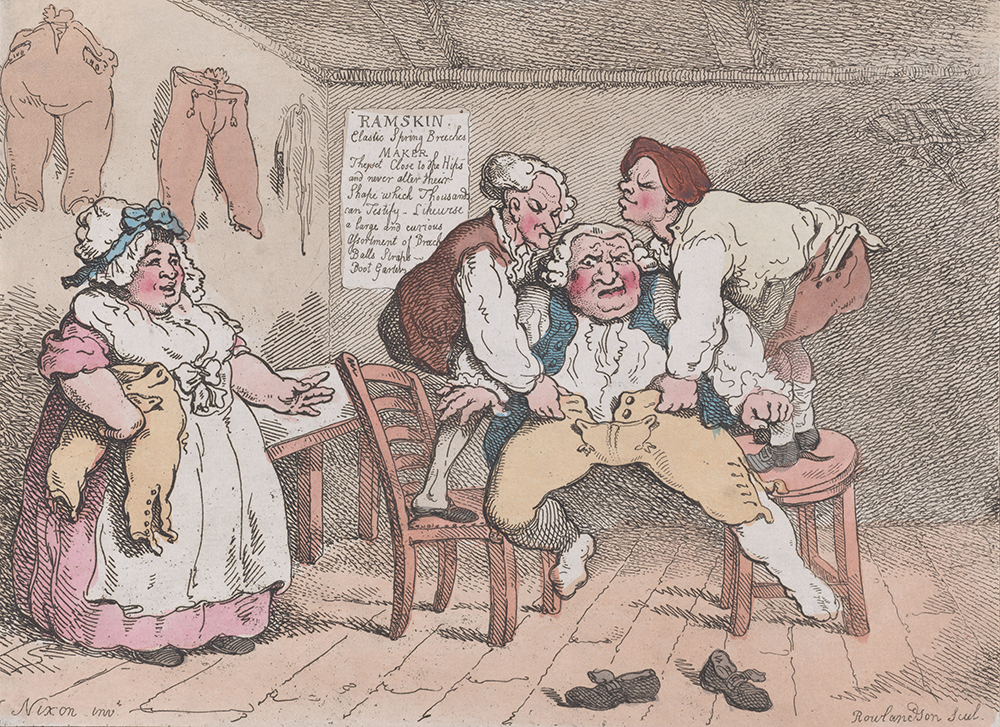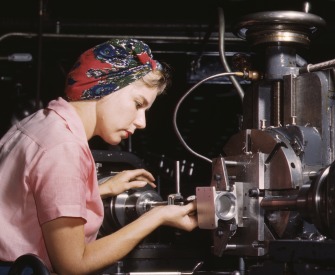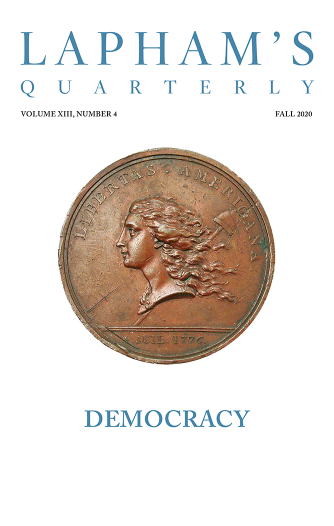As usual, what we call “progress” is the exchange of one nuisance for another nuisance.
—Havelock Ellis, 1914Machine Learning
Thomas Carlyle sees “no end to machinery.”
Were we required to characterize this age of ours by any single epithet, we should be tempted to call it not a heroical, devotional, philosophical, or moral age but, above all others, the mechanical age.
It is the age of machinery, in every outward and inward sense of that word; the age which, with its whole, undivided might, forwards, teaches, and practices the great art of adapting means to ends. Nothing is now done directly or by hand; all is by rule and calculated contrivance. For the simplest operation, some helps and accompaniments, some cunning abbreviating process, is in readiness. Our old modes of exertion are all discredited and thrown aside. On every hand, the living artisan is driven from his workshop to make room for a speedier, inanimate one. The shuttle drops from the fingers of the weaver and falls into iron fingers that ply it faster. The sailor furls his sail and lays down his oar and bids a strong, unwearied servant, on vaporous wings, bear him through the waters. Men have crossed oceans by steam; the Birmingham fire-king has visited the fabulous East; and the genius of the Cape, were there any Camões now to sing it, has again been alarmed, and with far stranger thunders than Gama’s. There is no end to machinery. Even the horse is stripped of his harness and finds a fleet fire-horse yoked in his stead. Nay, we have an artist that hatches chickens by steam; the very brood hen is to be superseded! For all earthly, and for some unearthly, purposes, we have machines and mechanic furtherances; for mincing our cabbages; for casting us into magnetic sleep. We remove mountains and make seas our smooth highway; nothing can resist us. We war with rude nature and, by our resistless engines, come off always victorious and loaded with spoils.
What wonderful accessions have thus been made, and are still making, to the physical power of mankind; how much better fed, clothed, lodged, and, in all outward respects, accommodated men now are, or might be, by a given quantity of labor is a grateful reflection which forces itself on everyone. What changes, too, this addition of power is introducing into the social system; how wealth has more and more increased and at the same time gathered itself more and more into masses, strangely altering the old relations and increasing the distance between the rich and the poor, will be a question for political economists and a much more complex and important one than any they have yet engaged with. But leaving these matters for the present, let us observe how the mechanical genius of our time has diffused itself into quite other provinces. Not the external and physical alone is now managed by machinery but the internal and spiritual also. Here, too, nothing follows its spontaneous course, nothing is left to be accomplished by old, natural methods. Everything has its cunningly devised implements, its preestablished apparatus; it is not done by hand but by machinery. Thus we have machines for education: Lancastrian machines, Hamiltonian machines, monitors, maps, and emblems. Instruction, that mysterious communing of wisdom with ignorance, is no longer an indefinable tentative process, requiring a study of individual aptitudes and a perpetual variation of means and methods to attain the same end, but a secure, universal, straightforward business, to be conducted in the gross, by proper mechanism, with such intellect as comes to hand. Then we have religious machines of all imaginable varieties; the Bible Society, professing a far higher and heavenly structure, is found on inquiry to be altogether an earthly contrivance, supported by collection of moneys, by fomenting of vanities, by puffing, intrigue, and chicane, a machine for converting the heathen. It is the same in all other departments. Has any man, or any society of men, a truth to speak, a piece of spiritual work to do, they can nowise proceed at once and with the mere natural organs but must first call a public meeting, appoint committees, issue prospectuses, eat a public dinner; in a word, construct or borrow machinery, wherewith to speak it and do it. Without machinery they were hopeless, helpless, a colony of Hindu weavers squatting in the heart of Lancashire. Mark, too, how every machine must have its moving power, in some of the great currents of society; every little sect among us, Unitarians, utilitarians, Anabaptists, phrenologists, must have its periodical, its monthly or quarterly magazine—hanging out, like its windmill, into the popularis aura, to grind meal for the society.
With individuals, in like manner, natural strength avails little. No individual now hopes to accomplish the poorest enterprise single-handed and without mechanical aids; he must make interest with some existing corporation and till his field with their oxen. In these days, more emphatically than ever, “to live signifies to unite with a party or to make one.” Philosophy, science, art, literature, all depend on machinery. No Newton, by silent meditation, now discovers the system of the world from the falling of an apple; but some quite other than Newton stands in his museum, his scientific institution, and behind whole batteries of retorts, digesters, and galvanic piles imperatively “interrogates nature”—who, however, shows no haste to answer. In defect of Raphaels and Angelos and Mozarts, we have royal academies of painting, sculpture, music, whereby the languishing spirit of art may be strengthened, as by the more generous diet of a public kitchen. Literature, too, has its paternoster-row mechanism, its trade dinners, its editorial conclaves and huge subterranean puffing bellows, so that books are not only printed but in a great measure written and sold by machinery. National culture, spiritual benefit of all sorts, is under the same management. No Queen Christina, in these times, needs to send for her Descartes, no King Frederick for his Voltaire, and painfully nourish him with pensions and flattery: any sovereign of taste who wishes to enlighten his people has only to impose a new tax and, with the proceeds, establish philosophic institutes. Hence the royal and imperial societies, the bibliothèques, glypothèques, technothèques, which front us in all capital cities, like so many well-finished hives, to which it is expected the stray agencies of wisdom will swarm of their own accord and hive and make honey. In like manner, among ourselves, when it is thought that religion is declining, we have only to vote half a million’s worth of bricks and mortar and build new churches. In Ireland it seems they have gone still further, having actually established a penny-a-week purgatory society! Thus does the genius of mechanism stand by to help us in all difficulties and emergencies and, with his iron back, bears all our burdens.
These things, which we state lightly enough here, are yet of deep import and indicate a mighty change in our whole manner of existence. For the same habit regulates not our modes of action alone but our modes of thought and feeling. Men are grown mechanical in head and in heart as well as in hand. They have lost faith in individual endeavor and in natural force of any kind. Not for internal perfection but for external combinations and arrangements, for institutions, constitutions—for mechanism of one sort or other do they hope and struggle. Their whole efforts, attachments, opinions, turn on mechanism and are of a mechanical character.
We may trace this tendency in all the great manifestations of our time; in its intellectual aspect, the studies it most favors and its manner of conducting them; in its practical aspects, its politics, arts, religion, morals; in the whole sources, and throughout the whole currents, of its spiritual, no less than its material, activity.
Nowhere, for example, is the deep, almost exclusive faith we have in mechanism more visible than in the politics of this time. Civil government does, by its nature, include much that is mechanical and must be treated accordingly. We term it, indeed, in ordinary language the Machine of Society and talk of it as the grand working wheel from which all private machines must derive, or to which they must adapt, their movements. Considered merely as a metaphor, all this is well enough; but here, as in so many other cases, the “foam hardens itself into a shell,” and the shadow we have wantonly evoked stands terrible before us and will not depart at our bidding. Government includes much also that is not mechanical and cannot be treated mechanically, of which latter truth, as appears to us, the political speculations and exertions of our time are taking less and less cognizance.

New Invented Elastic Breeches, by Thomas Rowlandson, c. 1812. The Metropolitan Museum of Art, Elisha Whittelsey Collection, Elisha Whittelsey Fund, 1959.
Nay, in the very outset, we might note the mighty interest taken in mere political arrangements as itself the sign of a mechanical age. Men are to be guided only by their self-interests. Good government is a good balancing of these and, except a keen eye and appetite for self-interest, requires no virtue in any quarter. To both parties it is emphatically a machine: to the discontented, a “taxing machine”; to the contented, a “machine for securing property.” Its duties and its faults are not those of a father but of an active parish constable.
Thus it is by the mere condition of the machine, by preserving it untouched or else by reconstructing it and oiling it anew, that man’s salvation as a social being is to be ensured and indefinitely promoted. Contrive the fabric of law aright, and without further effort on your part, that divine spirit of freedom which all hearts venerate and long for will of herself come to inhabit it, and under her healing wings, every noxious influence will wither, every good and salutary one more and more expand. Nay, so devoted are we to this principle, and at the same time so curiously mechanical, that a new trade specially grounded on it has arisen among us under the name of “codification,” or code making in the abstract, whereby any people, for a reasonable consideration, may be accommodated with a patent code—more easily than curious individuals with patent breeches, for the people does not need to be measured first.

Thomas Carlyle
From “Signs of the Times.” “Man is not the creature and product of mechanism,” the Scottish historian and essayist writes elsewhere in this essay, “but, in a far truer sense, its creator and producer.” The piece, whose title derives from the Gospel According to Matthew, appeared in the Edinburgh Review in 1829, eight years before his three-volume history The French Revolution established his reputation. “Carlyle was in the classic tradition of the prophet,” wrote historian Gertrude Himmelfarb. “And it was as such, as a prophet, that he was read and respected by the Victorians whom he so severely chastised.”


